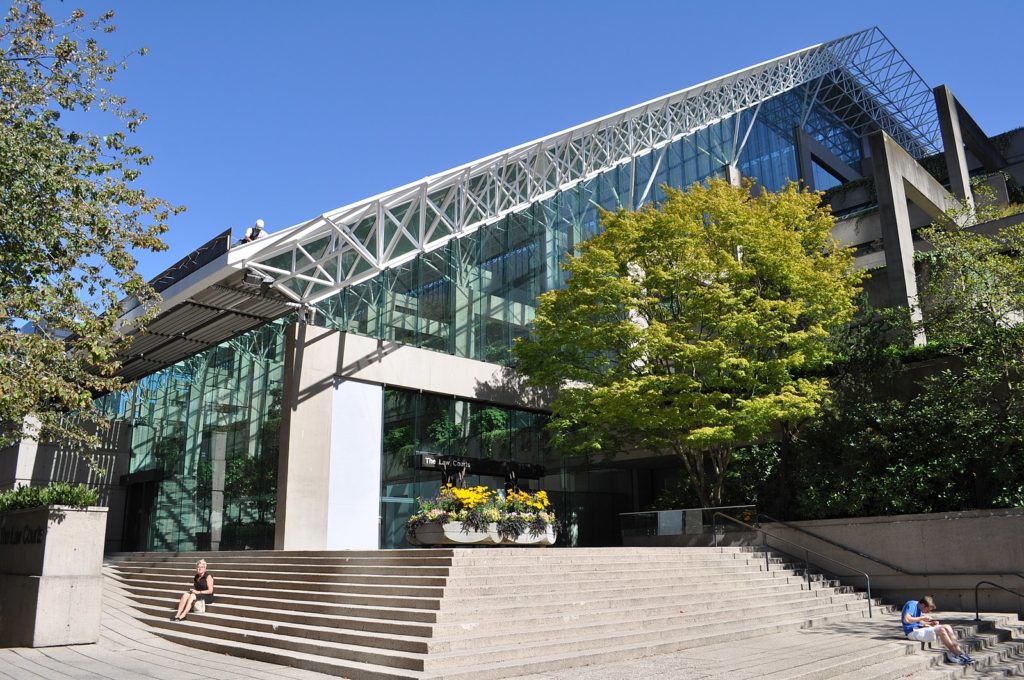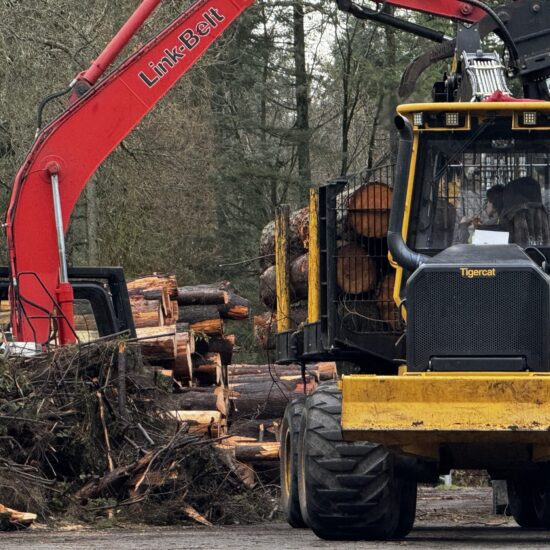
Bob Mackin
The members of the Non-Partisan Association (NPA) board who unsuccessfully sued then-mayor Kennedy Stewart for defamation lost their appeal of a judge’s order that they pay full indemnity costs.
In a Dec. 21 B.C. Court of Appeal decision, published Jan. 8 on the court’s website, a tribunal unanimously decided in favour of Stewart.

Law Courts Vancouver (Joe Mabel)
“The costs order is subject to a deferential standard of review. In light of the judge’s legal and factual findings, it was open to her to conclude that full indemnity costs were warranted in the circumstances,” said the decision, written by Justice Joyce DeWitt-Van Oosten with agreement from Justices Gregory Fitch and Ronald Skolrood.
David Mawhinney, Christopher Wilson, David Pasin, Phyllis Tang, Angelo Isidorou, Federico Fuoco, and Wesley Mussio sued Stewart after his early 2021 news release that claimed right-wing extremists had taken over the NPA board.
In July 2022, B.C. Supreme Court Justice Wendy Baker threw out the defamation lawsuit when she ruled Stewart acted in the public interest and without malice. Stewart had alleged their action was brought in bad faith or for an improper purpose and he successfully defeated the lawsuit under the Protection of Public Participation Act because the two sides were in a political competition en route to the 2022 civic election.
In her March 2023 ruling on costs, Baker wrote that the defamation claim had substantial merit, but the plaintiffs did not prove they were harmed. She ordered the plaintiffs to pay Stewart’s legal costs in excess of $126,000, but declined to award him damages.
By last July, costs had reached $155,000 when Court of Appeal Justice David Frankel required the seven to pay $25,000 to Stewart before B.C.’s highest court would consider their appeal, which was focused solely on the costs issue.
When their appeal was heard Dec. 14, the appellants asked for the full indemnity costs order to be set aside and for the parties to bear their own costs in the lower court action. They argued Baker failed to consider whether the defamation action was typical of a SLAPP — strategic lawsuit against public participation — and they claimed she misapprehended evidence.
Through their lawyer, Karol Suprynowicz, they claimed that the judge erred by not using a four-point test to determine whether their case was a SLAPP, specifically whether there was: a history of litigation aimed at silencing critics; a power or financial imbalance; motivation of punishment or retribution; or whether they suffered minimal or nominal damages.
“The fact that the judge made no reference to the absence of a history of initiating lawsuits (not a matter of dispute) or the appellants’ offer to resolve the matter through an apology does not mean that she failed to consider these items,” the ruling said. “More importantly, whether these parts of the record attracted weight, and how much, was for her to decide in the context of her analysis as a whole.
DeWitt-Van Oosten also said the appellants had attached so many terms to the apology proposal that it would have amounted to Stewart making an admission of full liability.
“The respondent declined to apologize on that basis. Before us, counsel for the appellants acknowledged that after the respondent communicated his refusal, the appellants did not re-engage on the issue,” DeWitt-Van Oosten wrote. “Given the terms of the proposed apology and the lack of re-engagement, it is not at all surprising to me that this aspect of the procedural history was not mentioned by the judge.”
DeWitt-Van Oosten also dismissed the appellants’ argument that Baker misapprehended evidence. She agreed with Stewart that they sought to “re-litigate the issue of costs and have the court reach its own evidentiary conclusions from the record. This we cannot do.”
Stewart was not immediately available for comment. Mussio said he hoped the decision would spur the provincial government to fix the law.
“The ability to say derogatory things about your foes in public while suffering no consequences and straddling your foes with their and your legal bills is an unintended consequence of the poorly worded legislation,” Mussio said.
However, both parties in the court of law battle suffered severe defeats in the court of public opinion.
Stewart and his Forward Together party candidates lost in the October 2022 election when former NPA leader Ken Sim and his ABC Vancouver party won a city council supermajority.
All NPA candidates under Beijing-based leader Fred Harding were similarly shut-out at the ballot box.
Support theBreaker.news for as low as $2 a month on Patreon. Find out how. Click here.











